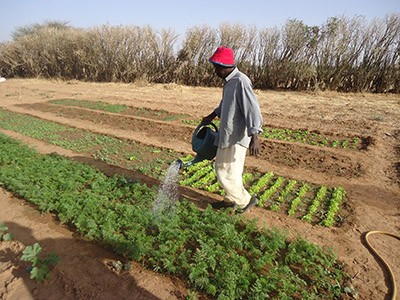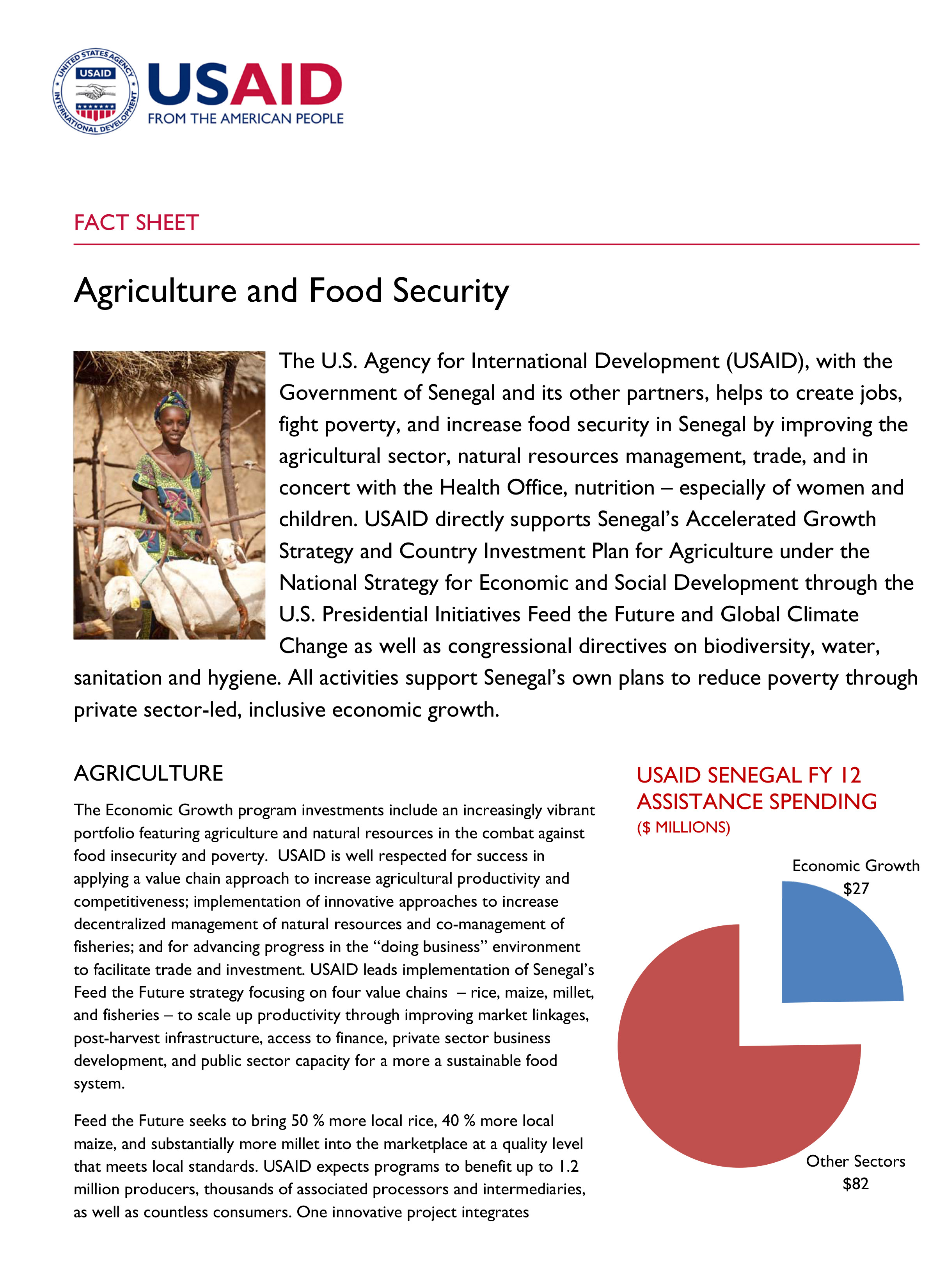
The U.S. Agency for International Development (USAID), with the Government of Senegal and its other partners, help to create jobs, fight poverty, and increase food security in Senegal by improving the agricultural sector, natural resources management, trade, and in concert with the Health Office, nutrition – especially of women and children. USAID directly supports Senegal’s Accelerated Growth Strategy and Country Investment Plan for Agriculture under the National Strategy for Economic and Social Development through the U.S. Presidential Initiatives Feed the Future and Global Climate Change as well as congressional directives on biodiversity, water, sanitation and hygiene. All activities support Senegal’s own plans to reduce poverty through private sector-led, inclusive economic growth.
Agriculture
The Economic Growth program investments include an increasingly vibrant portfolio featuring agriculture and natural resources in the combat against food insecurity and poverty. USAID is well respected for success in applying a value chain approach to increase agricultural productivity and competitiveness; implementation of innovative approaches to increase decentralized management of natural resources and co-management of fisheries; and for advancing progress in the “doing business” environment to facilitate trade and investment. USAID leads implementation of Senegal’s Feed the Future strategy focusing on four value chains – rice, maize, millet, and fisheries – to scale up productivity through improving market linkages, post-harvest infrastructure, access to finance, private sector business development, and public sector capacity for a more a sustainable food system.
Senegal - Agriculture and Food Security Fact Sheet ![]() (pdf - 186k)
(pdf - 186k)
Feed the Future seeks to bring 50 % more local rice, 40 % more local maize, and substantially more millet into the marketplace at a quality level that meets local standards. USAID expects programs to benefit up to 1.2 million producers, thousands of associated processors and intermediaries, as well as countless consumers. One innovative project integrates agriculture and nutrition to boost household income and nutritional levels in Senegal’s most under-nourished regions. USAID assists Senegal’s sizable fisheries sector, which makes a high-value economic and nutritional contribution to Senegal, through policy and sustainable management to reverse diminishing fishing resources.
Environment
Recognizing that growth depends on a sustainable resource base, USAID is directly addressing broader environmental issues to ensure sustainability of natural resources. There is a clear link between the sustainable management of natural capital, conservation of biodiversity, and increased economic opportunities and local governance. USAID focuses on ecosystem management in Senegal’s southeastern, forested areas and coastal regions of the Casamance and the Sine-Saloum Delta. USAID is also helping increase Senegal’s capacity to adapt to climate change and variability. USAID supports the government of Senegal’s efforts to achieve reform of its fisheries sector by putting in place and strengthening many of the enabling conditions necessary for improved governance, while simultaneously demonstrating effective tools and
approaches for sustainable ecosystem-based collaborative management of marine fisheries.
Water, Sanitation and Hygiene
Senegal is making progress in achieving the Millennium Development Goal for urban water supply, with lesser progress for rural water supply and sanitation. USAID assists the government to achieve these goals through activities that help increase sustainable access to water supply and sanitation services, and promote better hygiene in small towns as well as rural and peri-urban areas. USAID is coordinating with the government and other donors on an integrated approach to address interrelated social, governance, economic, health, ecological and sustainability challenges in the sector. USAID expects to provide 180,000 people with access to improved drinking water supply and 100,000 people with improved sanitation facilities by 2015.
Business Environment and Competitiveness
Alongside agriculture programs, USAID works with government and the private sector to boost Senegal’s overall business environment and competitiveness. This includes targeted interventions to design and implement reforms that can also improve Senegal’s rankings in key international benchmarks such as Doing Business and the Global Competitiveness Report. USAID supports a range of reforms related to commercial law, labor law, and computerization of building permit issuance, among others. USAID also assisted the government in preparing the Senegal National Competitiveness Report, an objective examination of Senegal’s major economic strengths and weaknesses. USAID supported the launch of the first Competitiveness forum to engage broad national dialogue and to formulate actions to improve competitiveness, unleash greater direct investment, and stimulate jobs and to raise economic performance.








Comment
Make a general inquiry or suggest an improvement.